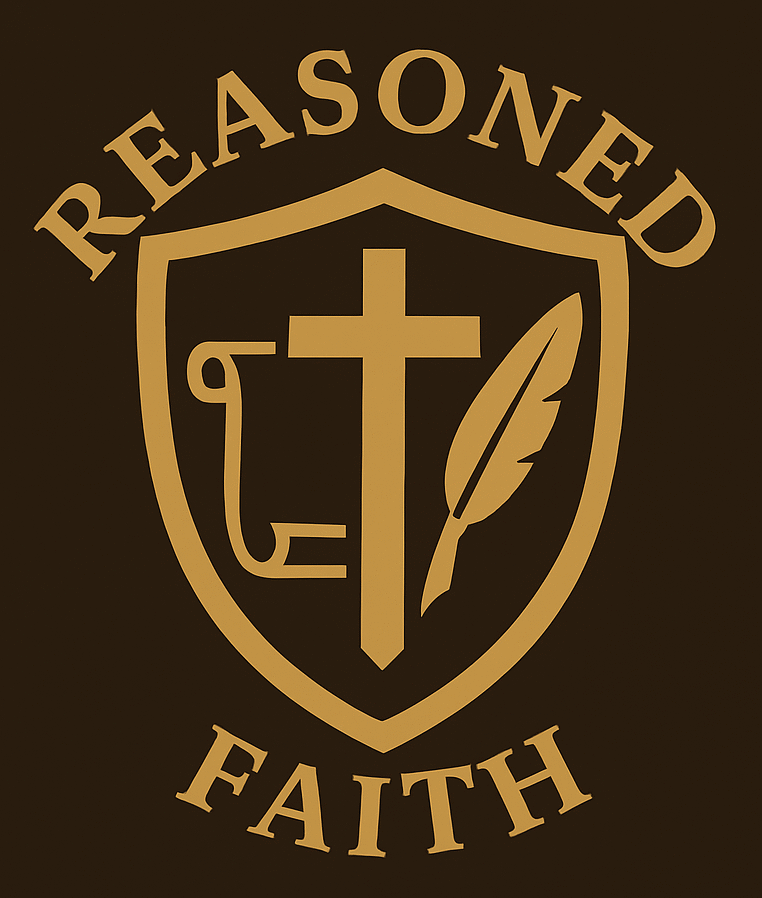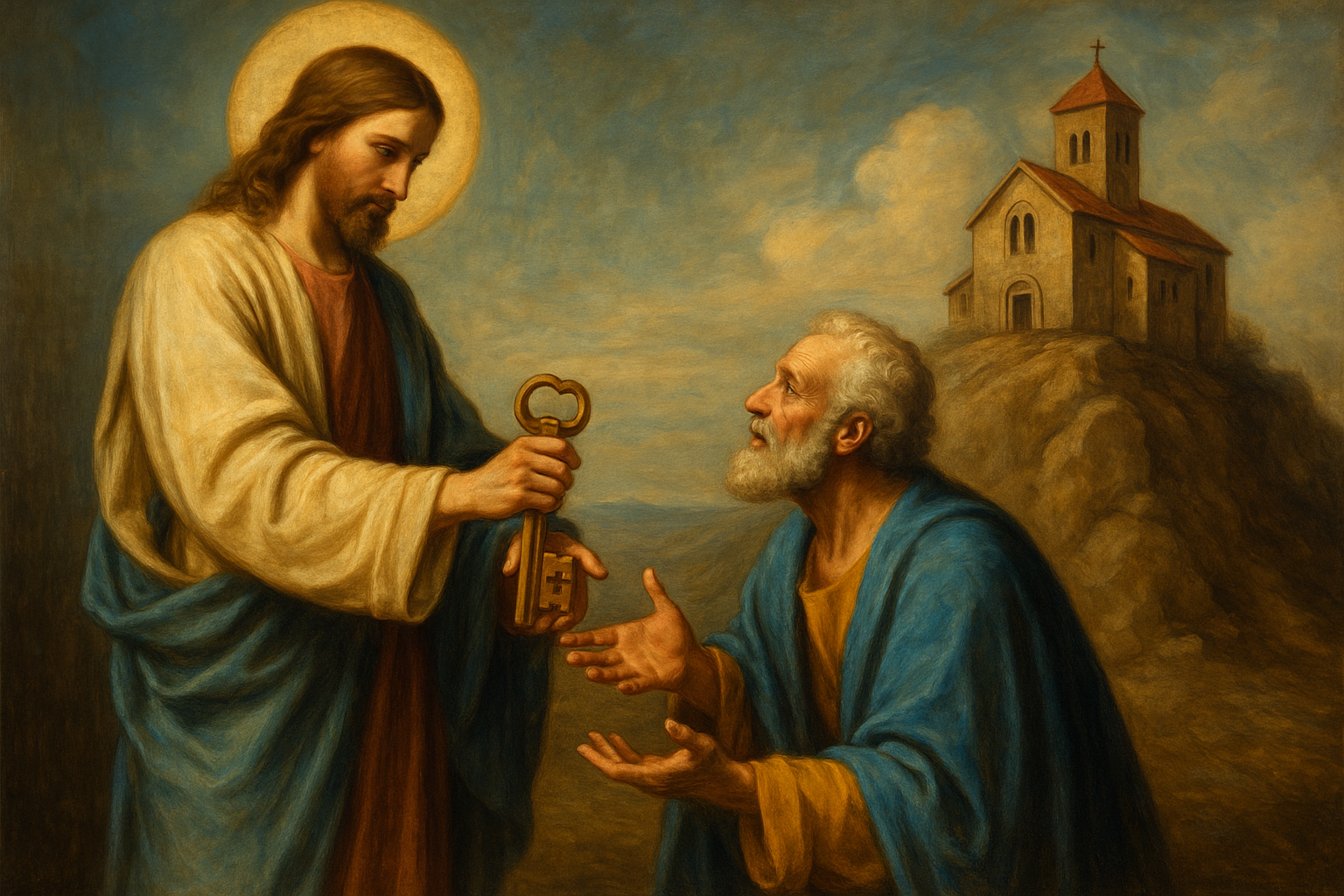
One common objection to the Catholic view of the papacy is the claim that Peter’s leadership was personal and did not carry on after his death. But Scripture tells a different story. Let’s examine the biblical evidence to see whether Peter’s role was a passing moment or the foundation of something enduring.
Jesus Personally Commissions Peter (Matthew 16:18-19)

Jesus gives Simon a new name: Peter (“Rock”). In the Bible, name changes signal a divine mission (e.g., Abram to Abraham, Jacob to Israel). Jesus then declares:
“You are Peter, and on this rock I will build my Church. I will give you the keys of the kingdom of heaven…” (Matthew 16:18-19)
Peter alone receives the keys, a symbol of royal authority (cf. Isaiah 22:20–22), which in ancient Israel signified a steward appointed over the king’s house. Jesus uses that same imagery to describe Peter’s role in the kingdom of heaven.
This is not just about faith; it’s about office and authority. The Church is not built on a passing moment or just Peter’s insight—it’s built on Peter himself. This is a structural promise, not a personal pat on the back.
Peter is Charged with Shepherding the Flock (John 21:15-17)
After the Resurrection, Jesus publicly restores Peter and charges him with the care of His flock:
“Feed my lambs… Tend my sheep… Feed my sheep.”
This threefold command echoes Peter’s three denials, but it goes beyond reconciliation. Jesus is entrusting Peter with the role of shepherd—language used throughout Scripture to describe leadership over God’s people (cf. Psalm 23; Ezekiel 34).
It’s important that Jesus speaks only to Peter, though others are present. The role of tending and feeding “the sheep” isn’t distributed here—it’s concentrated. And since Jesus refers to “my sheep”, this leadership is over the universal Church, not just a local group.

Peter Leads the Church in the Book of Acts
Peter’s role doesn’t fade after the Gospels. If anything, it grows clearer:
- Acts 1:15–22 – Peter initiates the selection of Judas’s successor.
- Acts 2:14–41 – Peter preaches the first apostolic sermon and converts 3,000.
- Acts 3:1–10 – Peter heals a lame man at the temple gate.
- Acts 4:8–12 – Peter boldly addresses the Sanhedrin.
- Acts 5:1–11 – Peter confronts Ananias and Sapphira.
- Acts 10–11 – Peter receives a vision and opens the Church to the Gentiles.
- Acts 15:7–11 – At the Council of Jerusalem, Peter settles the debate before James offers a pastoral proposal.
The pattern is clear: Peter doesn’t merely participate—he leads. He speaks first, acts decisively, and the Church often falls silent after he speaks (Acts 15:12).
Jesus Prays for Peter Alone (Luke 22:31-32)
“Simon, Simon, behold, Satan demanded to have you [plural], but I have prayed for you [singular] that your faith may not fail. And when you have turned again, strengthen your brothers.”
This is not just personal care—it’s a divine safeguard of Peter’s role. Jesus prays only for Peter by name. And He gives him the mission of strengthening the others.
This moment reveals something profound: Peter’s stability affects the others. That’s leadership. That’s primacy.
Peter’s Name Always Comes First
In all apostolic lists (Matthew 10:2; Mark 3:16; Luke 6:14; Acts 1:13), Peter is named first. Matthew even emphasizes this:
“The names of the twelve apostles are these: first, Simon, who is called Peter…” (Matthew 10:2)
The Greek word protos means more than “first in order”—it implies chief or preeminent. It’s the same word used to describe Christ’s supremacy (Colossians 1:18).
Meanwhile, Judas Iscariot is always last. This isn’t just alphabetical. It reflects a clear order of precedence.
Peter is also the spokesperson in critical moments (Matthew 16:16; Acts 2:14). He speaks for the Twelve. He asks Jesus the tough questions. He steps out of the boat. He’s the visible leader.
Shared Authority Doesn’t Cancel Leadership
It’s true that all the apostles were commissioned by Jesus to preach, baptize, and forgive sins (cf. Matthew 28:19–20; John 20:22–23). But shared authority does not eliminate leadership.
Even today, bishops share authority with the pope, but the pope is still the visible head. The apostles worked as a group, but Peter clearly had primacy. He wasn’t a dictator, but he was the chief steward among equals.

The concept of primacy among equals—leadership without eliminating collegiality—is deeply biblical.
A Lasting Foundation, Not a Passing Phase
Peter is not just a temporary spokesperson. He’s the rock. The leader. The steward.
Jesus didn’t build His Church on sand or shifting roles. He gave it structure, starting with a rock. And rocks don’t move.
If the apostles were meant to have successors (which they did—see Acts 1:20-26), then why wouldn’t the office of Peter continue as well?
Peter’s role makes sense in a long-term structure. He had no specific local church. His mission was broad (1 Peter 1:1)—to churches throughout Asia Minor. This hints at a universal role, not limited to one place.
The idea that Peter’s leadership ended with him contradicts the biblical pattern of continuity in God’s covenants. God established structured, lasting leadership in Israel. Jesus, fulfilling and perfecting the covenant, wouldn’t do less for His Church.

Conclusion
Scripture does more than hint at Peter’s unique role—it declares it.
Peter receives the keys, the shepherding role, the name change, the personal prayer of Jesus, and a leadership role that continues into Acts. If you follow strictly biblical doctrine, you must wrestle with the fact that Peter was more than just a prominent apostle. He was the rock upon which Christ built His Church—and that rock wasn’t meant to be temporary.
Want to go deeper? Explore how Peter’s leadership evolved into the papacy:
*This post contains affiliate links. If you make a purchase through these links, I may earn a commission at no extra cost to you. As an Amazon Associate I earn from qualifying purchases.
- Upon This Rock: St. Peter and the Primacy of Rome in Scripture and the Early Church
by Stephen K. Ray
🔹 A thorough biblical and patristic defense of Peter’s primacy and its continuation in the papacy. - Jesus, Peter and the Keys: A Scriptural Handbook on the Papacy
by Scott Butler, Norman Dahlgren, and David Hess
🔹 An easy-to-use, verse-by-verse reference guide defending the papal office. - Pope Peter: Defending the Church’s Most Distinctive Doctrine in a Time of Crisis
by Joe Heschmeyer
🔹 Combines Scripture, history, and logic to show that the papacy was instituted by Christ. - The Biblical Basis for the Papacy
by John Salza
🔹 A compact but powerful biblical case for Peter’s primacy and its transmission to the popes.


I was always taught never to dive too deep into certain topics of discussion. One of those is religion. We all have our opinions, and opinions are as numbered as the individuals that may offer them. Being a Christian, I read through your article and appreciate the quality references on Peter being a seemingly chosen favorite of God and of Christ while he was on Earth. You included a graphic showing what Peter was awarded by God, and what the Pope “carries” on with tradition – one of the items that the Pope holds, according to the list, is the Keys to the Kingdom. I do not post this comment as an attack on anyone’s belief, as we all are entitled to believe what we want to believe. However, in reference to this particular item, I believe that we all, as Christians we are all promised “the keys to the kingdom” by God himself. Those keys are passed on to us through the death of Christ on the cross. And for all that believe in Him and do God’s will, those will retain the keys to the kingdom (heaven).
Again, this is just my opinion, and not intended as an offense to anyone else that may believe differently.
Thank you for your thoughtful comment. I’m not trying to argue either — just enjoying a sincere conversation.
About Peter being a “seemingly” chosen favorite, Scripture points to something even stronger: Jesus specifically chooses Peter by renaming him “Rock” (Matthew 16:18), giving him the keys to the kingdom (Matthew 16:19), praying that Peter’s own faith would strengthen his brothers (Luke 22:31-32), and personally telling him to “feed my sheep” (John 21:15-17). It’s not just a matter of personal opinion — the Gospels show Jesus clearly setting Peter apart.
As for the “keys,” you made an interesting point. Christ’s death opened Heaven to all who believe and do God’s will, but the keys symbolize something different: an office of authority (Isaiah 22:22), not just salvation. Peter alone is entrusted with the visible stewardship of Christ’s household on earth. Catholics believe the Pope carries on that office — not as a personal reward, but as Christ’s plan for the Church’s leadership and unity.
I’m genuinely curious — what Scripture or teaching led you to understand the keys as being given to every believer individually? I’d really like to hear your thoughts.
P.S. Feel free to continue the conversation here, or if you’d like a little more back-and-forth dialogue, you’re welcome to join me on my Reasoned Faith Facebook page: https://www.facebook.com/ReasonedFaith.
This article gave me a fresh perspective on Peter’s leadership especially how the biblical symbolism of the “keys” and the “rock” goes beyond a moment and points to a lasting office. I hadn’t fully connected the continuity from Acts to modern Church structure like this before. Your explanation of “primacy among equals” was really eye-opening. Do you think modern objections to the papacy mostly come from misunderstanding biblical context or from historical events?
Thank you! I’m really glad the article helped connect the dots. I think most objections today come from a mix of both—some people haven’t seen how deeply the papacy is rooted in Scripture, while others are reacting to real historical failings. That’s why it’s so important to go back to the biblical foundation and understand what Jesus actually set in place through Peter. When we see the structure He gave the Church, it brings clarity and continuity.